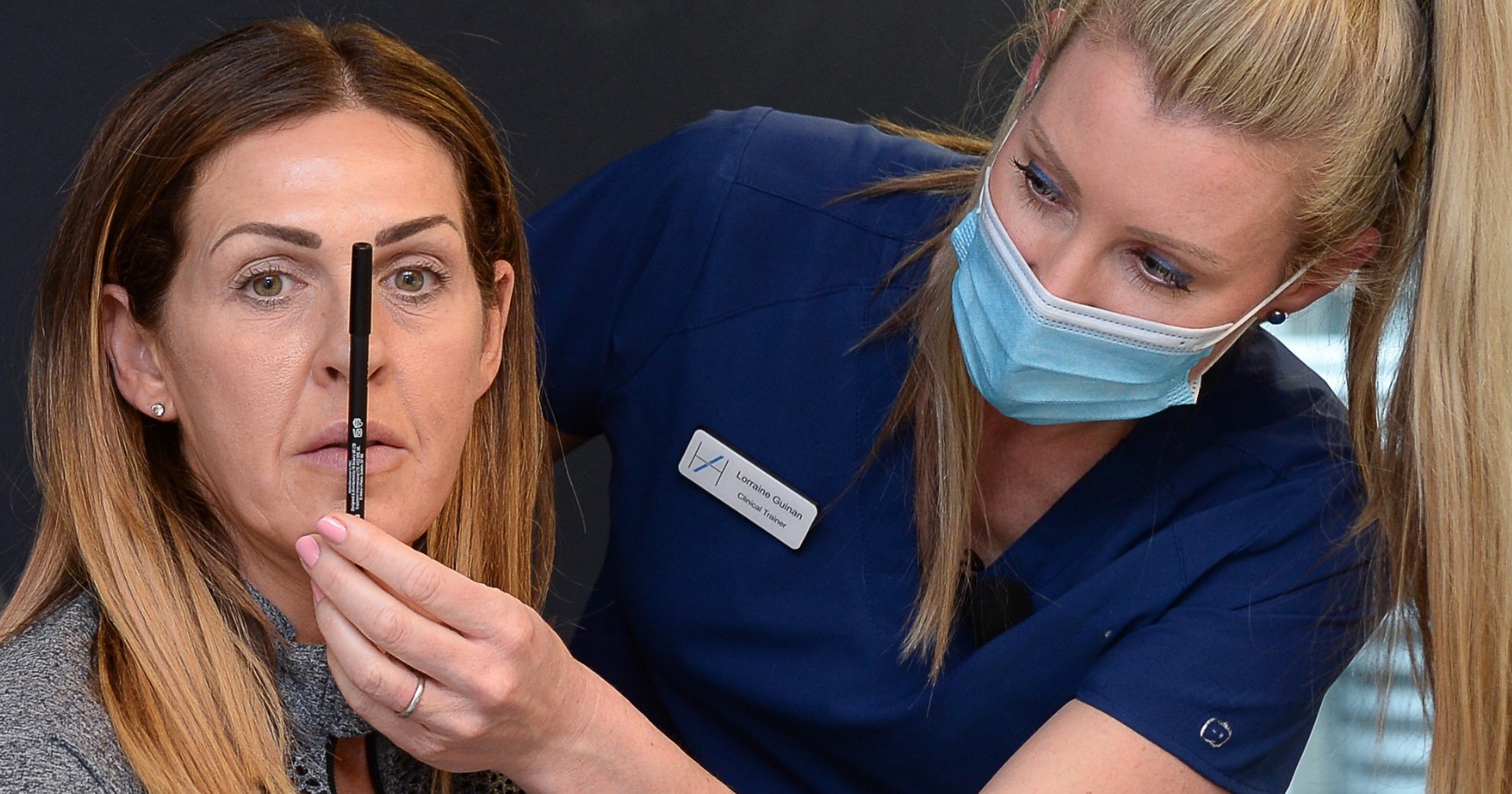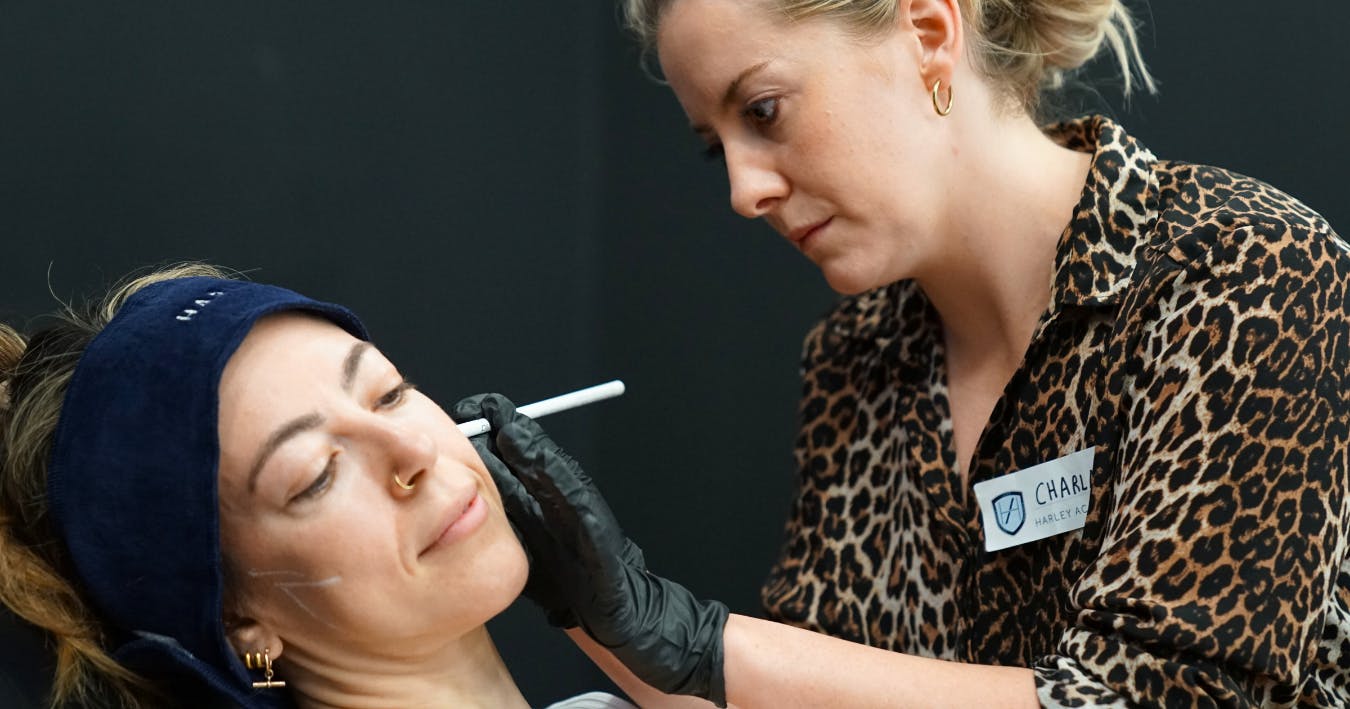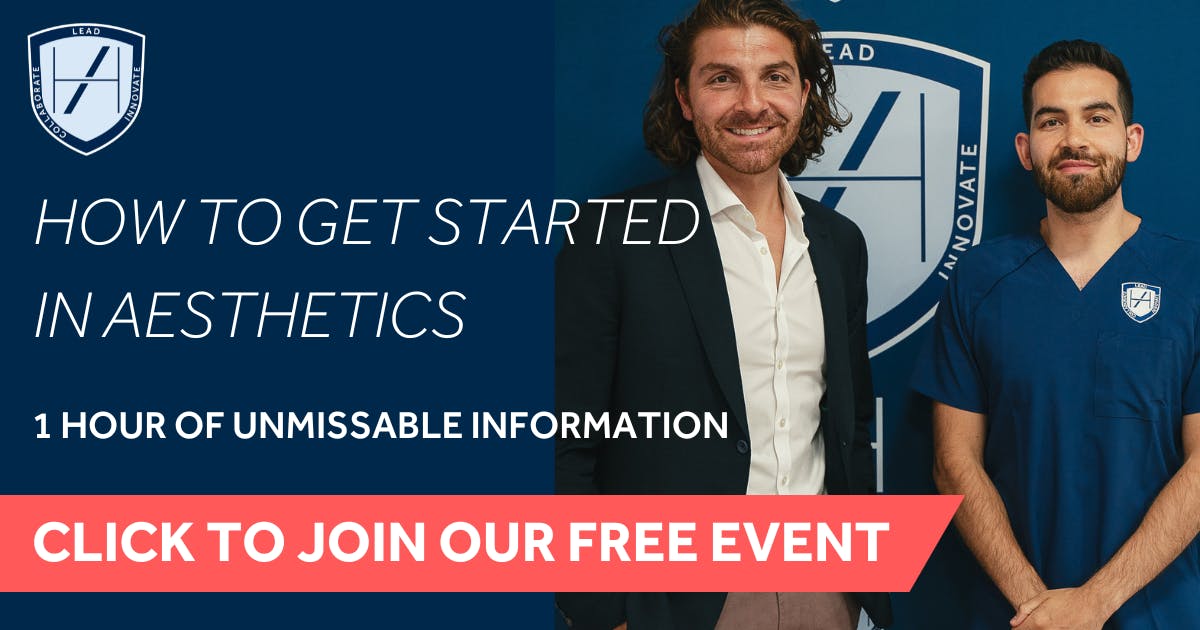How to Become a Successful Aesthetic Nurse Practitioner

Are you considering becoming an aesthetic nurse practitioner? Wondering what it takes to become successful in aesthetic medicine? Let us help.
As the UK’s leading provider of higher education in aesthetic medicine, with more graduates than any other, we’ve supported many nurses as they navigate this journey.
Whilst everyone defines ‘success’ differently, there are certain factors that can be generally applied. Here we set out some key steps and advice to inform your career pathway...

Draw on your existing medical skills and nursing experience
Nurses often make outstanding aesthetic practitioners. Why? Because of your strong foundation in patient care. You’re already trained to assess holistically, rather than just treating symptoms. This mindset translates well into aesthetics where a deep understanding of the whole face, and the person, is required.
You’re also used to managing risk, thinking clinically, and staying calm under pressure. These are essential attributes when dealing with complications or challenging patient scenarios.
There’s also that ‘gut feeling’ that you’ve finely tuned during your medical career. Never discount this valuable tool, regardless of the field you’re working in. It provides a vital warning sign that something isn’t right and further exploration is needed.
Nurses are usually great communicators, too. You know how to listen, explain treatments clearly, and build trust. In aesthetic medicine, having that type of human connection can be just as important as developing technical skill.
When approaching this new specialty, think of it as building on these foundations, rather than starting from scratch. You’ve worked long and hard to develop these transferable skills, so use them to your advantage!
Undertake the best aesthetics training course for you
NB. If you’re already practising and have completed your initial filler and botox courses, you can skip this section!
When you’re first starting out in aesthetics, there’s only one question you need to answer in order to find the best training pathway for you. That is, do you want to just get a feel for the field, or are you ready to dive straight in?
We’ve listed the two starting points for each pathway below, depending on your answer.
It’s also worth noting that you can start your aesthetics course as soon as you have your nursing PIN. You can also train whilst maintaining your regular NHS nursing or private work.
Just want to get a feel for aesthetics, to see if it’s right for you?
If you’re not yet ready to commit to a full aesthetic medicine qualification, taking a certified foundation training course in botox and fillers is your best option. Typically, this will be a one-day course, often with mandatory eLearning to be completed before hands-on training.
For example, our Foundation Training in Medical Aesthetics course requires trainees to complete a number of hours of online learning ahead of their practical training. They then enjoy a full day of recapping some of their eLearning essentials and practice toxin and filler treatments using mannequins. Next, they move on to injecting their very first aesthetic patients under the supportive guidance of our mentors.
Whilst you will not learn everything you need to know to become a successful aesthetic practitioner in one day, this will give you a solid grounding in cornerstone injectable treatments. If you decide to continue, you can then upgrade to our full qualification course.
You may find it helpful to read our article, What Does it Mean to be Certified vs Qualified as an Aesthetic Practitioner?
Ready to dive straight into a full aesthetics Diploma qualification?
If you know you’re ready to make a go of aesthetic medicine and are excited about immersing yourself in the specialty, a full qualification course is your best option.
This can be undertaken at a university, or through a reputable postgraduate aesthetics training provider, such as Harley Academy. The Joint Council for Cosmetic Practitioners (JCCP) has a list of its approved providers on its website. We’re proud to be both JCCP-approved as a training academy and have additional approval for our Level 7 Diploma in Cosmetic Injectables course.
Although this is a longer pathway, it provides you with the best foundation upon which to build your long-term aesthetics career. You can also start practising privately as soon as you’ve arranged your insurance cover, after completing the foundation part of your course.
At Harley Academy, our Level 7 Diploma is a rigorous botox and fillers course which follows the latest evidence, using the GEM© framework. It’s an Ofqual-regulated qualification that’s designed to support safe, ethical, evidence-based practice from the start.
It helps you to build genuine confidence, not just in your injecting techniques, but in clinical reasoning and treatment planning. This makes all the difference when you're treating real patients. It’s hands-on and rooted in academic depth, with a focus on intimate mentoring sessions to maximise your learning.
Being taught high standards for effective, evidence-based, ethical aesthetic practice from the outset allows you to start strong, stay safe, and build a career you can be proud of. It’s also a great way to attract patients!
Your respected qualification can become a great marketing tool that helps you stand out from the crowd.
Unsure which pathway is right for you? Our fantastic course advisors have helped thousands of nurses transition their medical careers to aesthetics in a way that worked for them. Book a call with them for a day and time that suits you, to benefit from their free advice and insights!
Boost your confidence with regular practice
Regular practice helps aesthetic nurse practitioners turn theory into instinct. Seeing patients often, even just one day or a few evenings per week, builds real confidence based on genuine experiences. You get to face real-life clinical scenarios, with all their surprises and nuances, providing a learning goldmine!
It also sharpens your judgment. You start noticing how different patients respond to the same product or technique. You become faster, more efficient and more deliberate in your decisions. And by applying what you’ve just learned while it’s still fresh, you make it stick.
Whilst private practice is the obvious starting point, you can also attend additional practical botox and filler courses, such as Injectables Masterclasses, to get more hands-on experience.
If you start seeing patients whilst you’re undertaking your Level 7 course with us, you can talk through any queries you have during breaks in your mentoring sessions. Our supportive faculty all run successful practices of their own or work for established clinic chains, and have many years of experience to draw upon, outside of their extensive teaching intelligence.
Our Founder and CEO, Dr Tristan Mehta advises allowing yourself at least a full year of regular practice to really refine your approaches. Aim to treat 500 patients in your first year of practice, outside of your mentoring. That’s roughly 10 patients per week for 50 weeks, so there’s still room for some time off!
He advises, “I often advise new aesthetic practitioners to focus on gaining experience in their first year, not profits. Treat as many patients as you safely can to build confidence, skill and clinical reasoning. Offering treatments at a price that just covers your costs can take the pressure off and help you focus on learning. The goal is to become truly competent and comfortable, so you’re ready to charge your worth when the time comes.”
The more you practice, the more you’ll experience different patients and presentations, allowing for exponential on-the-job learning.
Refine your skills during this growth period
Whilst you should never really stop evolving as an aesthetic practitioner, this is a particularly advantageous time for cementing your core skills.
“One of the things I'm fixated on in medical aesthetics is the actual skill you have holding a syringe with a needle or with a cannula,” shares Dr Tristan. “This is something we don't focus on enough. We can talk all we want about complications management and anatomy and different fillers, but ultimately how good are you with your hands? How good are you and how precise are you and how stable are you? What do you know about how to inject to make things easier for you and more comfortable for the patient?
“We often get questions around treating different patient types; sometimes you'll notice when you're treating the cheeks the tissues are very responsive, you get a beautiful result. It doesn't bleed and the patients are happy. Other times, you're going to inject a patient and you're not going to see a big result. Maybe you're going to find it tough to get through the tissues and maybe the patient is ultimately very bruised by the end of it. Your job as an injector is to accept that there's going to be a huge variety of patient types and your approach has to be so finessed that, whether you're treating a patient who's considered very straightforward or one who’s more challenging, you're minimising the risk of variability.”
Consider becoming an aesthetic nurse prescriber
If you’re unable to prescribe, you’ll need to allocate dedicated time and money towards paying for a prescriber to work with you. It’s mandatory for your prescribing partner to have face-to-face consultations with your patients every time they require a treatment that involves a prescription medication.
Additionally, as you’re unable to hold stock, you’ll need to factor prescribing arrangements into your emergency protocols for complications management.
Whilst many nurses do this, it’s far simpler, more convenient and more cost effective to become a prescriber yourself. You can undertake a V300 prescribing qualification at a number of universities in the UK. However, it’s worth noting that many require you to have a Level 7 aesthetics qualification as part of their entry criteria.
You may find our interview with Shantel Noble, RGN - a Level 7 graduate, cosmetic nurse prescriber and Harley Academy clinical trainer - of interest. We spoke to her about the process of taking her prescribing qualification and how she found the experience.
It does require time and financial commitments, but if you’re planning a long-term aesthetics career, it’ll be worth the investments.
Use your nursing background to attract aesthetic patients
As we’ve already highlighted, your experience as a nurse gives you more than clinical skills. It gives you that quiet, professional confidence that patients instinctively respond to and helps them build trust.
Many patients are looking for an aesthetic practitioner who can treat them safely, of course, but also someone who can listen. Someone who can understand their concerns and reassure them with credibility.
You’re used to handling complex patient histories and know what red flags look like. Patients also know that nurses are used to injecting on a regular basis.
That kind of training sets you apart from non-medical injectors, and even other medics without your background in clinical care. When you're marketing yourself, even subtly, the reassurance your ‘nurse’ status brings, combined with your training, goes a long way.
Never be afraid to talk about your background in patient care. Don’t be shy about saying that safety matters to you more than shortcuts. For patients who are anxious, or just realistic and looking for high quality care, that can be the deciding factor.
What to highlight to attract quality patients
Remember, you only need one or two patients to help you start building your client list, and your portfolio.
Use all the tools at your disposal to attract the right patients - the ones who actively seek out healthcare professionals for their aesthetic treatments, and are happy not to cut corners when it comes to their safety.
This means highlighting your:
- Medical background and nursing experience
- Aesthetics training and qualifications
- Any professional affiliations, such as being a member of the Nursing & Midwifery Council (NMC), Royal College of Nursing (RCN), British Association of Medical Aesthetic Nurses (BAMAN), etc
- Any professional awards or accolades.
You can, of course, post and advertise on social media or by using flyers and posters. Sometimes, if you’re practising from within an existing organisation, they may allow you to send promotional emails to their database, and put up posters. Explore all these avenues but, when you use them, make sure you’re not underselling yourself by communicating all your achievements!
Consider taking an injecting job at an established clinic
Starting out in aesthetics can feel like a leap, especially if you’ve come from a fairly regimented framework, such as the NHS. Some cosmetic nurses want to go straight into self-employment. However, joining an established aesthetics clinic can be a smart move.
Not only does this approach give you structure, with access to regular patients and income. It also means you’re not building everything from scratch whilst working on your confidence and competence. In the right environment, there’s mentoring, too, and being part of a team.
It also gives you valuable insights into the business side of aesthetics. After all, it’s likely building a business will be new to you, so keep your eyes and ears open to maximise the everyday learning opportunities available.
That way, if you do go on to open your own practice later, you’ve seen what works, what doesn’t and what you’d do differently. You’ll also have the confidence and professional relationships that come from experience, putting you at a greater advantage.
Never stop learning
The most successful aesthetic nurses don’t stop learning. It’s not just about collecting courses. It’s about building a coherent skill set that actually serves your patient demographic.
As one of our senior clinical trainers, aesthetic nurse prescriber, Natalie Haswell, RGN, advises, “You cannot read enough, you cannot train enough, you cannot learn enough. If you’re not confident, you just need to practice more. And don’t give up - keep going. Even eight years in, there are moments where I think ‘I can’t do this’. But I can - you can - and that’s when you know you’re growing.”
The usual route is to start with neurotoxin, then start to introduce certain filler treatments suited to your development stage and confidence. As you start seeing patients regularly, that’s when you’ll find your niche. Perhaps you love skin and want to add Cosmetic Dermatology services to your menu. Or maybe you’re fascinated by a specific approach, such as full face rejuvenation. Keep learning with purpose. Choose courses and CPD that align with what your patients need, not just what’s trending.
And evidence matters. Seek out providers and qualifications that push you to think critically, not just copy a technique. Patients are becoming savvier; they’re asking more questions. You want to be the practitioner who has the answers—and can explain them with clarity.
Develop your reputation as an aesthetic nurse practitioner
Reputation in aesthetics grows one patient at a time, so every touchpoint matters.
From how you greet someone, to how thoroughly you explain risks, to how you follow up. These all add up. A patient who feels safe and heard will recommend you without needing to be asked.
Of course, clinical results matter but don’t underestimate the power of communication as this is where your nursing skills shine. You know how to have difficult conversations, such as how to say “no” to a treatment that isn’t in someone’s best interest. These moments are where reputations are truly made.
Create a seamless patient experience
Patients aren’t just judging your results either, they’re judging how it felt to be treated by you. From booking to aftercare, they’re looking for an easy, straightforward experience.
Start by looking at your systems. Is it easy to book with you? Are your pre-treatment forms clear? Do patients know what to expect and how to prepare for their appointments?
Consider your clinic experience. It doesn’t have to be luxurious, but it should feel calm, professional and clean. These small details help you to build trust before ever picking up a syringe.
After treatment, your follow-up matters more than you might think. You need to ensure patients have all the information they need to get the most from their treatment - never just rely on verbal communication, here. Also, small gestures, such as quick check-in, even just a quick message, can set you apart and keep patients returning… and referring!
Determine what ‘success’ looks like for you
Being a nurse is a strength in aesthetic medicine, not just a credential. The caring mindset, clinical focus and the ability to handle complexity all translate so well. When combined with ongoing training, thoughtful patient communication and a clear understanding of where you’re heading, these skills can become foundations for a truly rewarding career.
But what does success look like for you? It’s not always about running your own business or earning more money. These are laudable goals, but they’re not for everyone.
Success can be having the flexibility to spend more time with your family or doing other things you love. It can be having a better work/life balance, so you’re not at the mercy of a rota you have no control over. Maybe it’s about having a creative outlet that makes you happy.
Whatever your ‘why’ is, by continually putting in the effort, staying curious and knowing what you’re working towards, you’ll have your own roadmap to success. It may take a while, it may not be a linear journey, and you’ll certainly have wobbly moments! But long-term success is all about cyclical growth and a thoughtful approach to developing your practice.
All information correct at time of publication
Download our full prospectus
Browse all our injectables, dermal fillers and cosmetic dermatology courses in one document
By submitting this form, you agree to receive marketing about our products, events, promotions and exclusive content. Consent is not a condition of purchase, and no purchase is necessary. Message frequency varies. View our Privacy Policy and Terms & Conditions
Attend our FREE open evening
If you're not sure which course is right for you, let us help
Join us online or in-person at our free open evening to learn more
Our Partners













STAY INFORMED
Sign up to receive industry news, careers advice, special offers and information on Harley Academy courses and services


